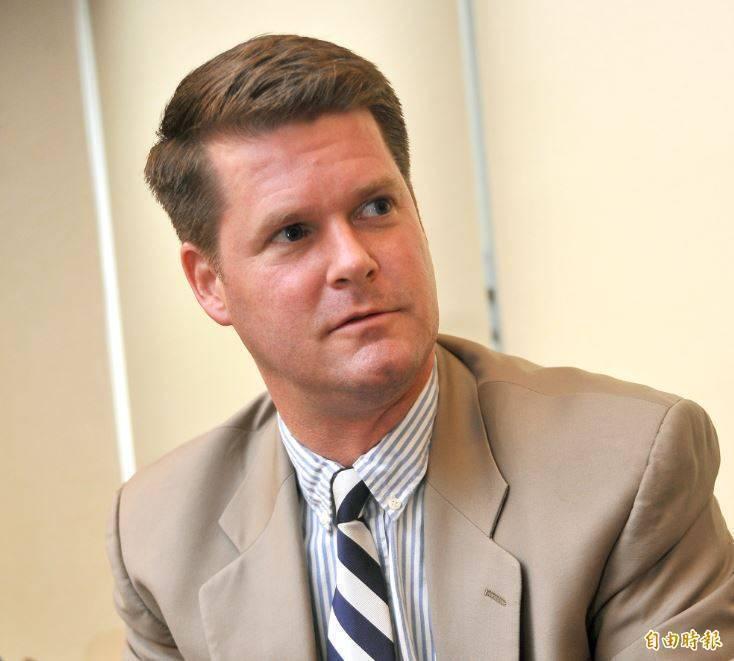Randall Schriver, former US assistant secretary of defense for Indo-Pacific security affairs, said yesterday that the US should "strengthen" its training of Taiwan's armed forces to help boost their combat readiness.
Schriver, who is now the chairman of the board of the American think tank Project 2049 Institute, made the comment during a US Senate Foreign Relations Committee hearing as a witness, when he was asked by Republican Senator Dave McCormick about his views on the US government's efforts to deter a cross-Taiwan Strait war.
In response, Schriver said it has been an evolutionary process, in which the US has become more direct in language and rhetoric on the issue.

Photo: Taipei Times file photo
In addition, the US has been moving into areas that were previously too sensitive, like the training of Taiwanese military forces, he said, adding that the US should enhance its initiatives in those areas.
"We need to strengthen our training of Taiwan military forces," Schriver said. "That was a taboo for decades, and now we're getting them to a point where they're more professional, more proficient, as they're placing a greater emphasis on training."
As part of the cross-strait war deterrence strategy, the US should also encourage Taiwan to consider adopting a more modernized command and control that would help optimize battlefield decisions, given the changing nature of warfare, he said.
"They need to look at a lot more unmanned, autonomous, and in every domain, including underwater," he said.
Schriver, who served as assistant secretary of defense for Indo-Pacific security affairs during US President Donald Trump's first term in office, also said that the US needs to help develop the Philippines, particularly Northern Luzon, given its proximity to the Taiwan Strait.
The US military has been helping to train Taiwan military forces for decades but has been doing so discreetly due to the sensitive nature of such actions.
In March last year, Taiwan's then-Defense Minister Chiu Kuo-cheng (邱國正) confirmed that US military personnel were being rotated to provide training to the armed forces in Taiwan, including conscripts, and Taiwanese soldiers were also receiving training in the US. He did not give any specifics for security reasons.
Yesterday's hearing in the US Senate was titled "Shared Threats: Indo-Pacific Alliances and Burden Sharing in Today's Geopolitical Environment."
Before the hearing began, Republican Senator Jim Risch, chairman of the Senate Foreign Relations Committee, said China's rising aggression in the Indo-Pacific region should be confronted, "but America should not be the world's only watchdog."
"To counter Chinese aggression, we need our allies to work with us to ensure each of us is strong and capable of pushing back," he said, calling for the allies to "expand US basing and overflight access" around the Indo-Pacific.
"The best way to show China that we stand together is if we are physically present in the region," Risch said.

Taiwan is stepping up plans to create self-sufficient supply chains for combat drones and increase foreign orders from the US to counter China’s numerical superiority, a defense official said on Saturday. Commenting on condition of anonymity, the official said the nation’s armed forces are in agreement with US Admiral Samuel Paparo’s assessment that Taiwan’s military must be prepared to turn the nation’s waters into a “hellscape” for the Chinese People’s Liberation Army (PLA). Paparo, the commander of the US Indo-Pacific Command, reiterated the concept during a Congressional hearing in Washington on Wednesday. He first coined the term in a security conference last

Prosecutors today declined to say who was questioned regarding alleged forgery on petitions to recall Democratic Progressive Party (DPP) legislators, after Chinese-language media earlier reported that members of the Chinese Nationalist Party (KMT) Youth League were brought in for questioning. The Ministry of Justice Investigation Bureau confirmed that two people had been questioned, but did not disclose any further information about the ongoing investigation. KMT Youth League members Lee Hsiao-liang (李孝亮) and Liu Szu-yin (劉思吟) — who are leading the effort to recall DPP caucus chief executive Rosalia Wu (吳思瑤) and Legislator Wu Pei-yi (吳沛憶) — both posted on Facebook saying: “I

The Ministry of Economic Affairs has fined Taobao NT$1.2 million (US$36,912) for advertisements that exceed its approved business scope, requiring the Chinese e-commerce platform to make corrections in the first half of this year or its license may be revoked. Lawmakers have called for stricter enforcement of Chinese e-commerce platforms and measures to prevent China from laundering its goods through Taiwan in response to US President Donald Trump’s heavy tariffs on China. The Legislative Yuan’s Finance Committee met today to discuss policies to prevent China from dumping goods in Taiwan, inviting government agencies to report. Democratic Progressive Party Legislator Kuo Kuo-wen (郭國文) said

The Ministry of Economic Affairs has fined Taobao NT$1.2 million (US$36,900) for advertisements that exceeded its approved business scope and ordered the Chinese e-commerce platform to make corrections in the first half of this year or its license would be revoked. Lawmakers have called for stricter supervision of Chinese e-commerce platforms and more stringent measures to prevent China from laundering its goods through Taiwan as US President Donald Trump’s administration cracks down on origin laundering. The legislature’s Finance Committee yesterday met to discuss policies to prevent China from dumping goods in Taiwan, inviting government agencies to report on the matter. Democratic Progressive Party